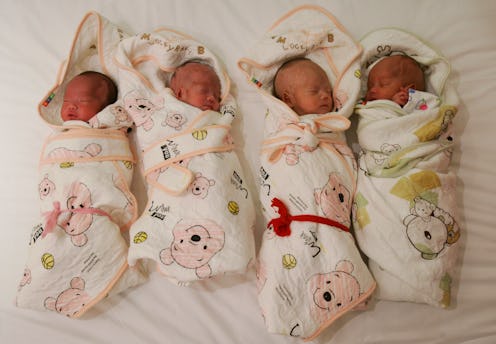News
Babies Are Way Smarter Than We Thought, Study Says
Spoiler alert: it turns out that babies are far more than just little eating, pooping, and onesie-ruining machines after all. In fact, according to a new study, they are way smarter than we've been giving them credit for. In the online medical journal eLife, University of Louvain revealed last week that babies' brains develop years faster than once thought, with a key stage of that development — the one dealing with facial perception — happening in babies as young as four months. This is pretty big news considering we used to think it happened when kids start to read (which in some cases might not be until early grade school). Way to go, science!
As a press release for the study notes, the way humans perceive faces by using the brain's right hemisphere is actually one of our most unique features, separating us from other primates. This allows us to not only tell people apart from one another, but also inform how we visually categorize objects. Study co-author and Principal Investigator at the University of Louvain Bruno Rossion spoke of the significance of this development to eLife, noting that the findings could open new doors in brain research:
Just as language is impaired following damage to the brain's left hemisphere, damage to the right hemisphere can impair our ability to distinguish faces, so it is critical to understand how it develops.
To do so, researchers strapped tiny fitted caps with electrodes on 15 babies as they sat on their mom's laps. (The mental image that alone conjures up for me is all sorts of weird and adorable, but I digress.) While the babies sat there, no doubt wondering why they were being subjected to wearing such ridiculous hats, the researchers flashed hundreds of images in front of them in rapid succession over a 20-second period. As for what they were shown, it pretty much ran the gamut — from 48 photos of faces with different lighting, angles, and backgrounds to 200 images of different animals, plants, and other objects.
Each image flashed before the babies was shown for just 166 milliseconds, which researchers noted was comparable to the rate used in a similar study on adults. While this happened, study authors paid close attention to each baby's brain activity, and reported that each time an image of a face was shown, the right hemisphere of the baby's brain showed a significant spike in stimulation. What's more, the difference between the reactions of the brain's right and left hemisphere was even more pronounced than it was in the same study done with adults.
Added Rossion:
Given the enormous resources devoted to digital face recognition, the babies' brain accomplishment is not trivial. The success of this research method in babies demonstrates that it can be used in all ages to improve our understanding of how we develop the ability to perceive complex images.
Of course, it's important to note that as far as studies go, this one was super small. Scientists would have to study far more than just 15 babies to draw some definitive conclusions. But for now, the findings are significant enough to signal to researchers that more exploration should be done on this aspect of early cognitive development. (Hopefully that will lead them to uncover even more ways in which babies are really just tiny geniuses capable of far more than we think.)
